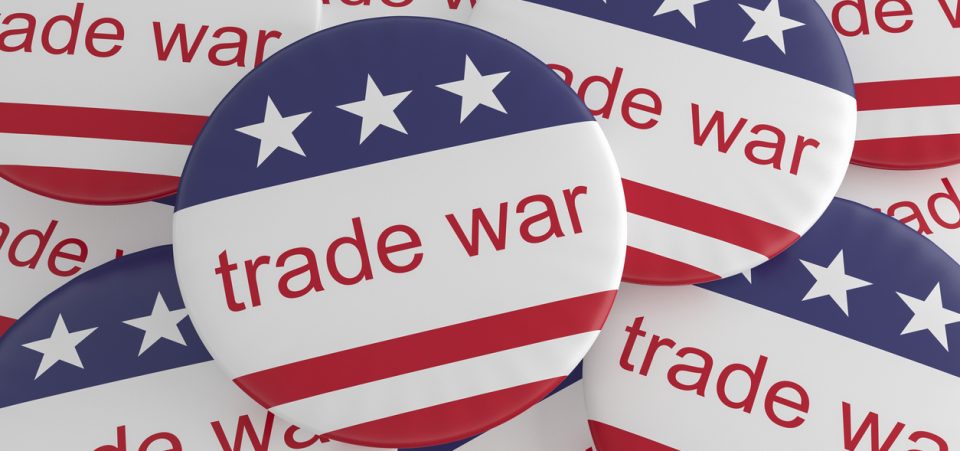Trump’s Trade War With the World Has Turned Into an Economic Collapse Trigger
This can’t be good. Whatever emerges from the June 8–9 G7 summit in Canada, the world is witnessing an inauspicious convergence of problems threatening global economic collapse.
The most curious aspect is that, in 2018, the leader of the capitalist world, the United States, has embarked on a path of unprecedented isolationism. The United States now threatens to reverse any gains made during the recovery from the 2008 financial crisis.
President Donald Trump appears to be pursuing economic collapse by way of trade wars. He might as well have hired George Lucas as Secretary of the Treasury. The script promises acrobatic stunts and a gripping plot line.
As much as Italy’s new euro-skeptic government or Argentina’s default hazard could exacerbate global economic problems, the G7’s biggest fears are focused on Washington—specifically, President Trump’s new tariffs on steel and aluminum.
America’s Allies See Trump’s Tariffs as Threats
The new U.S. tariffs have exploded on the international scene. To suggest that tariffs have become unusual, especially among alleged allies, is an understatement. In fact, the very oddity of Trump’s move, coming after at least two decades of trade barrier erosion, renders the very idea of economic collapse.
Therefore, the new U.S. tariffs have unleashed a frenzy at the preparatory financial G7 summit. That meeting concluded with a unanimous complaint against America’s new and aggressive trade policy.
The G7 summit may not be all that important in the overall scheme, but Trump’s new trade war has turned the 2018 edition into a most memorable one. And it has established a theme for the world economy that will extend for the duration of Trump’s presidency.
In practical terms, Trump’s tariffs mean that the world’s leading economic powers will pester U.S. Treasury Secretary Steven Mnuchin (or whoever succeeds him, if he meets a similar fate to that of other Trump cabinet members).
A G7 Summit to Remember
The G7 will pretend to act united, purporting to present a common front against Trump’s apparent protectionism. But individually, all countries will try to make separate deals with Washington.
That’s Trump’s strategy, perhaps. He wants to divide and possibly conquer the G7. If the White House’s gamble pays off, the United States will end up with a brand new global trade mechanism.
The alternative, of course—and it’s a likely alternative—is that the G7 will become the “G6 + 1.” The United States will have pushed itself out of the current trade system.
It can choose to do that. But will the others agree to play this game after Washington decides that economic isolation doesn’t work?
After all, the economic isolation that Trump is pursuing also involves putting political pressure on key allies such as Germany.
Translation: the U.S. appears to be doing everything possible to convince its international partners to consider—privately, if not publicly—that the United States is an unreliable ally at best (not unlike Turkey in the NATO context), or even a rogue state.
Rogue Ambassadors and Economic Collapse Triggers
The new U.S. ambassador to Germany, Richard Grenell, in this sense, has not made friends. Of course, many of Trump’s voters (but not all, especially the disappointed Bernie Sanders Democrats who voted Republican in 2016) couldn’t care less.
And that, surely, would be a massive mistake. Grenell risks being expelled for having performed his diplomatic duties exactly as Trump has suggested: undiplomatically.
Grenell risks causing an international incident. He has overtly discussed his role, trying to influence EU politics. (Source: “Trump’s ambassador to Germany suggests he will intervene in European politics to ’empower conservatives’,” Independent, June 4, 2018.)
Therefore, he could get expelled, sparking a wave of low confidence in the markets and the global economy. The last time anything of this sort took place was during World War II.
Such risks cannot be accidental. Trump has been pursuing a deliberate policy of chaos and confusion. Some might even call it diplomatic and commercial “Shock and Awe.”
He may have sent the United States into a war-like scenario, and Trump may be issuing checks that the Oval Office can’t cash.
The Focus Is China, Even if EU Will Be an Inevitable Victim
Trump needs his international allies now. When it comes to global trade, Europe no longer counts for much. The real powerhouse is China. And Trump may be using Europe as a punching bag to show Beijing how strong and tough he can be.
Indeed, China is not a G7 member state. Despite Trump’s fighting words, Beijing’s trade surplus over the United States has been steadily rising. In May, it was some $22.0 billion. In March, it had been some $15.0 billion.
Therefore, any casual observer would conclude that Trump has burned his trade bridges with the EU while also increasing America’s dependence on trinkets from China.
For their part, the Chinese are prepared to act. They are demanding an end to Trump’s trade threats and the ongoing application of tariffs. Washington announced that it would impose a total of $50.0 billion in import duties on Chinese products and limit access to the U.S. high-tech sector.
And this is where the trade war that could lead to economic collapse begins.
A Trade War With China
The messages coming from the G7 summit, the interference in Germany’s politics, and the imposition of tariffs on steel and aluminum are all about a single issue.
That issue is a $100-billion trade war between the United States and China. It is approaching fast. The ongoing negotiations between the two economic superpowers have failed to produce an agreement. And the risks are intensifying.
China has already threatened to pull out of negotiations because Trump seems intent on proceeding along his own path like a bull in a china shop (no pun intended).
Such a tough position echoes the G7 uncertainty and anger. And it risks producing unpredictable repercussions for the markets. It increases uncertainty and volatility not only in the financial sense, but in the economic collapse sense.
The problem focuses on real trade, as in real exchanges, not financial speculation. Many jobs on all sides of the trade disputes are on the line.
Trade Wars Could End Up Producing a Black Swan Scenario
The trade war, at the global level, has had the effect of triggering tensions and concerns about growth and the potential for it to suddenly end. In other words, the trade wars have triggered fears of economic collapse.
The Europeans have done everything possible to boost gross domestic product (GDP), using rock-bottom interest rates to stimulate the EU’s economy. Unlike the U.S. Federal Reserve, the European Central Bank (ECB) has continued to buy bonds and keep interest rates near zero.
The 2008 financial crisis had battered many EU economies to such an extent that, even 10 years later, near-zero percent interest rates are necessary to keep the financial machinery running, as it were.
Trump’s trade policy could backfire and hit the United States first. China is not prepared to back down; it has a trump card of its own. It could start paying for oil and gas in yuan, buying from Iran.
Moreover, by pulling out of the Iran nuclear deal, Trump has left Iran little choice but to do everything possible to survive.
As the U.S. enforces too many restrictions and making subterfuge its main approach to global commerce, eventually China and Iran will work closely together.
China may even agree to buy more American goods, as it has promised Trump. But it can agree to buy those goods and still impose sanctions of its own.
Trump has forced the G7 to do the same.
The U.S. Risks Total Isolation
As the American rift with China continues, the United States risks total isolation, all in the name of “America First.” Rather than isolating itself from others, the others will be isolating themselves from the United States.
Economic collapse can be the sole result. The economic collapse in question does not necessarily have to happen in America though.
Trump has a logic in pursuing his all-out trade dispute with Beijing. Indeed, that may well be the strategy to contain China’s growth. After all, Trump has created a special post for Peter Navarro, a vociferous proponent in academic circles of the need to contain China.
Trump created a special post just for him: White House National Trade Council Director. (Source: “‘Death by China’ economist ascendant as Trump pushes tariffs, hits China,” Reuters, March 7, 2018.)
China may be building a railway to Europe, bypassing the need to rely on sea routes to export its impressive economic output.
But for the foreseeable future, the seas will remain the main outlet. There’s no escaping the geographic challenges, which allow the U.S. to isolate China, should the trade war evolve into something bigger.






